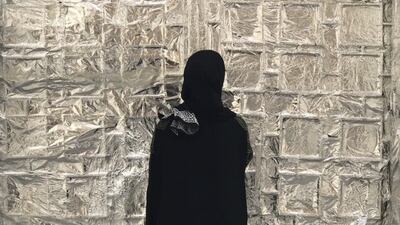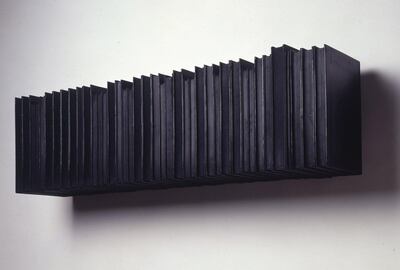By whichever criteria you use – geographical, cultural, intellectual or aesthetic – it’s a long way from Peckham, South London to Al Faisaliyah in Jeddah, but that is just part of the journey that has been made since 2016 by the six Saudi women who form Contemporary Collective.
The curators of We Are Not Alone, a new exhibition that opened at Jeddah's Athr Gallery last week, the members of Contemporary Collective have already succeeded in earning themselves a footnote in the history of art.
Not only does their show feature 27 artworks from British Council Collection never before seen in Saudi Arabia, including pieces by Yinka Shonibare, Ryan Gander, David Shrigley and Anish Kapoor, Cornelia Parker and Rachel Whiteread, but the women in question are also likely to be remembered as aesthetic pioneers who, with the help of the British Council, have set out to transform the Kingdom’s art scene.
“We are a collective and we aim to stay together. This is our first exhibition, but hopefully this will be the beginning of something great,” explains curator, gallery manager, and business developer Raneen Bukhari, who is also one of the driving forces behind Loud Art, an itinerant platform for emerging artists that ventures out from its base at Desert Designs Art Gallery in Al Khobar each year.
“We’re not looking at only at exhibitions and galleries, but at ways of conducting art in the public realm with the aim of bringing communities together through art in public spaces.”
Along with fellow Contemporary Collective members Solafa Rawas, Reem AlJalhami, Dalia Fatani, Maryam Bilal and Thahab Alosaimi, Bukhari was selected for the British Council’s intensive programme for fledgling curators and cultural managers, which was initially devised and structured by a Riyadh-based art consultant, Fiona Fox, in conjunction with the British Council.
The course started in May 2016 following a rigorous selection process.
“We wanted to create an exhibition that would involve the next generation of cultural and creative leaders in making decisions about what sort of contemporary art would be relevant in Saudi Arabia at a time when the country is going through such significant change,” explains Rehana Mughal, the British Council’s senior programme manager for culture and sport in the Gulf.
“Slowly, that started to form into an idea that we would run, as part of our work in skilling-up the next generation, a training programme for people in Saudi who don’t have access to art school programmes. People normally have to travel to gain an insight into what it takes to curate an exhibition.”
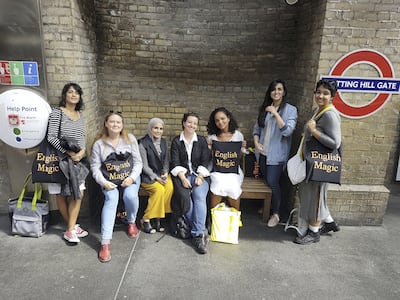
As well as a tour of the UK that took in visits to the Liverpool Biennial, Tate Britain and Tate Modern, Palace of Westminster and Hannah Barry’s Bold Tendencies, a not-for-profit creative enterprise and arts organisation located on the top four floors of a municipal car park in Peckham, the group also spent a week in the UAE and held weekly and monthly sessions in Saudi, all under the tutelage of the programme’s leader, Matilda Pye.
“The UK visit was designed to provide a crash course in different cultural spaces and strategies that are prevalent in the UK. It was a daily odyssey that ran from 9am to 9pm and I was completely bowled over by the women’s appetite and interest” Pye admits.
“They were really excited to meet people and look at things and were incredibly open and I could never have predicted that we would have stood on top of a car park in Peckham having a eureka moment.”
Remembering the moment for an article she is writing, Pye quotes one of the participants, Thahab Alosaimi.
“Bold Tendencies was so vibrant and managed to bring so many people with different interests to one place. I remember telling Dalia, ‘Wouldn’t it be awesome if such a space existed in Riyadh, can you imagine what young people could achieve in such a place?’ It really makes me want to start a similar space.”

A public engagement fellow at the Victoria & Albert Museum and national outreach curator with Royal Museums Greenwich, Pye was not only the course leader, but also acted as a mentor to the group, which includes women based in Jeddah and Riyadh, such as Dalia Fatani.
“I’ve been working for a while on my own in developing a creative community and studio in Riyadh to help build skills for individuals, to help them understand what creativity is and to develop an understanding of what the art world is like,” explains Fatani, the founder of Studio Lucha, who has a background in industrial design and fine art.
“My aim is to become a curator so that I can help my students and the people I am surrounded by locally in Riyadh, especially the ones who want to pursue a career in art, which is still a difficult choice because people know that artists often have a hard life,” she says.
“Over here we are still at the beginning – it’s a blank canvas - and a lot of the people who do make it do so because they work internationally or because they know the right people. Some make it, but it’s challenging.”
As well as teaching several of the modules on the course, Matilda Pye was also responsible for coordinating monthly visits from UK-based museum professionals, such as Ann Gallagher, Tate’s director of collections of British art and symposia led by curators from the University of the Arts, London and Artes Mundi, whose Cardiff-based director, Karen MacKinnon, ran a module in Riyadh called Art Beyond Gallery Walls.
“The idea was to introduce them to people and ideas so that when they were sat down and seriously thinking about these concepts, they had real tangible experience that they could map onto,” Pye explains.
As well as the bespoke programme and tour in London and Liverpool, the group also spent a week studying a course in arts management that is run between the Whitechapel Gallery and the British Council to give them the experience of being part of an international programme.
“There’s a thriving commercial art scene in Saudi Arabia and all across the Gulf, but what was artists, gallerists and collectors all recognised is that what is needed are curators and cultural producers with skills and knowledge that it was difficult to acquire inside Saudi,” she said.
As part of these modules, the participants were required to pitch their ideas for the exhibition that was to become We Are Not Alone to a panel of experts from the Saudi Arts Council, different galleries and collectors so that they could build their ideas for the exhibition and get feedback from the very people who they would be dealing with in future.
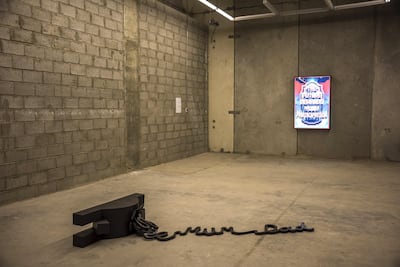
In order to actually deliver an exhibition, the collective was given access to the British Council Collection. Established in 1938 the collection, which has been referred to as a “museum without walls”, features work by more than 1,200 artists and contains more than 8500 works of contemporary British art.
“When you have access to the British Council Collection, you have access to very beautiful, big and bright Howard Hodgkins, you have access to very likeable Patrick Caulfields, but the collective didn’t go for those, they’ve gone for artworks that are quite extraordinary for a first exhibition,” Rehana Mughal admits.
“We wanted to pursue the idea that we are not really that different and that we all feel the same things and one of the issues we wanted to touch on was anxiety and fear of the unknown, things that we don’t understand,” explains Reem Bukhari.
“We really wanted to do something that was relevant and that connected the UK with Saudi Arabia and that connected to Saudi as a whole. We were thinking about what was happening right now.”
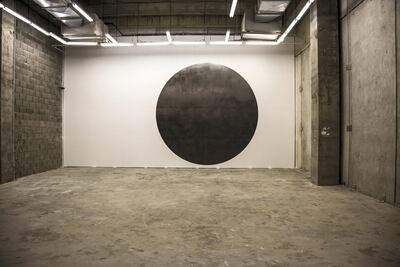
The result is a show that is designed to take visitors on an intellectual and emotional journey while encouraging them to be inquisitive, to ask questions and to reflect on the emotions and ideas that can result from rapid change.
One of the first pieces in the show is Gravity (2004), a white pencil and ink drawing on black canvas by the Iranian-born artist, Shirazeh Houshiary.
“From far away it looks like the explosion of an atomic bomb but when you get closer, you look at how meditative the act of drawing can be and it has a spiritual aspect that calms you down and I believe it has the capacity to speak to everyone,” explains Dalia Fatani.
The show also includes works such as Yinka Shonibare's Butterfly Kid (boy) II (2015), which addresses issues of colonialism, multiculturalism and race and a particularly well-travelled work from 2006, Mark Titchner's The Future Demands Your Participation, both of which come with added resonance in the contemporary Saudi context.
The final piece in the exhibition, a site specific commission made specially for the show, is Black Sun (2017), a wall drawing by the British Pakistani artist Mohammed Qasim Ashfaq that the group originally encountered at Hannah Barry Gallery in Peckham.
“Of course everything has a meaning, but we really want to encourage people to use their own judgement and to promote discussion and for people to understand and accept their anxieties,” explains Raneen Bukhari.
“To look at why they might be experiencing those feelings and then, at the end, to come to a peaceful recognition about how much we actually have in common.”
__________________________
Read more:
Art Jameel launches major commissions programme for new, Dubai-based works
Furniture designer Ayah Al Bitar launches Y Collection at Saudi Design Week
Empowering Saudi women can bring huge economic benefit
__________________________
